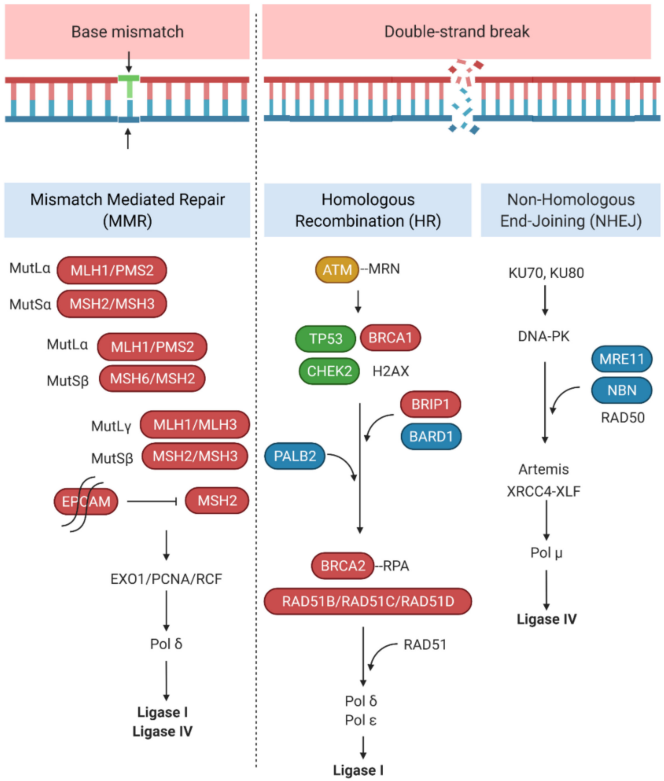Creative Biolabs is one of the leading providers of custom antibody generation and development services for R&D, diagnostic, and therapeutic applications. Especially, we have launched a series of in vitro diagnostic (IVD) antibody development services targeting numerous diagnostic biomarkers of human cancer diseases. Here, we focus on the BRCA1 protein as a marker of ovarian cancer.
BRCA1 Marker
BRCA1 protein, is encoded by the BRCA1 gene, which is a human tumor suppressor gene (to be specific, a caretaker gene). BRCA1 is alternatively called by the synonym breast cancer type 1 susceptibility protein, and is responsible for repairing DNA. It is commonly expressed in the breast cells and other tissue, in which they assist in repairing damaged DNA, or destroy cells in case of irreparable damage. The human BRCA1 contains four major domains: Zinc finger (C3HC4 type, known as the RING finger), the BRCA1 serine domain and two BRCA1 C Terminus (BRCT) domains. And it also contains nuclear localization signals and nuclear export signal motifs. BRCA1 is part of a protein complex that repairs DNA when both strands are broken. It participates in the double-strand repair mechanism, which is a homology-directed repair, and under this mechanism the repair proteins copy the identical sequence from the intact sister chromatid.
 Fig.1 The domain structure of BRCA1.1
Fig.1 The domain structure of BRCA1.1
Low Expression of BRCA1 in Ovarian Cancer
For years, it has been noted that loss of BRCA1 activity, either by germ-line mutations or by down-regulation of gene expression, results in tumorigenesis in specific target tissues. Particularly, declined BRCA1 expression contributes to sporadic epithelial ovarian tumor (EOCs) progression. Numerous studies have indicated that deficient homologous recombination repair resulted from BRCA1 deficiency is tumorigenic, because BRCA1 plays an essential role in repairing DNA damages, particularly double-strand breaks, by the potentially error-free mechanism of homologous recombination. DNA damage seems to be the main underlying cause of cancer, and excessive DNA damage may also increase epigenetic alterations due to errors during DNA repair. The frequent microRNA-induced deficiency of BRCA1 in ovarian cancers possibly facilitate the progression of this cancer type. Moreover, BRCA1 deficiency can initiate a cascade of molecular events that shape the evolution of high-grade serous ovarian tumor and determine its response to therapy.
 Fig.2 DNA repair pathways with genes linked to hereditary ovarian cancer.2
Fig.2 DNA repair pathways with genes linked to hereditary ovarian cancer.2
IVD Antibody Development Service Targeting BRCA1 Marker
Antibodies are core elements for antibody-based immunoassays for detecting and quantifying antigens of interest in all kinds of samples such as serum, urine, and tissue preparations. IVD antibodies are extensively used for disease screening, prognosis, and therapeutic monitoring. With our versatile IVD platform, Creative Biolabs is proud to develop novel BRCA1-specific antibody (pairs) from scratch to commercial IVD kits.
Our team consists of highly skilled and experienced scientists and professionals, fully dedicated and focused on the successful execution and completion of client projects. If you are interested in our services, please contact us to discuss your project needs.
References
- Fu, Xiaoyu, et al. "BRCA1 and breast cancer: molecular mechanisms and therapeutic strategies." Frontiers in cell and developmental biology 10 (2022): 813457. Distributed under Open Access license CC BY 4.0, without modification.
- Samuel, David, et al. "Hereditary ovarian carcinoma: cancer pathogenesis looking beyond BRCA1 and BRCA2." Cells 11.3 (2022): 539. Distributed under Open Access license CC BY 4.0. The image was modified by extracting and using only part of the original image.
For Research Use Only.